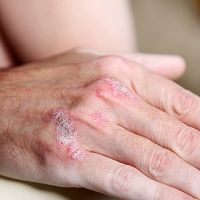Try Treating Psoriasis with Combination Biologic and Light Therapies
Taking the dual approach in biologic and phototherapy treatments appears to be a more beneficial clinical treatment method for patients suffering from moderate-to-severe psoriasis.

Taking the dual approach in biologic and phototherapy treatments appears to be a more beneficial clinical treatment method for patients suffering from moderate-to-severe psoriasis.
This route is particularly viable for those people who don’t respond to either as a single therapy.
The FDA has already approved several psoriasis biologic agents, including etanercept, adalimumab, and infliximab, the anti-interleukin- 12/2 antibody (ustekinumab), and the anti-interleukin-17 antibodies (secukinumab and ixekizumab).
But reports have shown many patients either exhibited an inadequate response or even loss of treatment efficacy after following a biologics-only regimen.
On the other hand, phototherapy has been considered a viable option by exposing the skin to narrow-band range of UV light (NBUVB) on a regular basis under medical supervision.
However, some experts had hypothesized the benefits of combining these two treatment methods, and Benjamin Farahnik, MD, Department of Dermatology, University of California, San Francisco, conducted a systematic review to analyze the use of combination biologic and phototherapy to treat moderate-to-severe psoriasis.
The team found that nine out of 10 studies indicated favorable efficacy and safety for the proposed combination therapy.
Researchers noted varied degrees of therapeutic enhancement.
According to the team, etanercept was the most common biologic used (in over 50% of the reported cases), with ustekinumab, adalimumab, and infliximab trailing behind. And on the phototherapy front, NVYVB was the most commonly used.
The authors concluded, “Although no regimen involving the combination of a biologic agent and phototherapy has been approved for the management of moderate-to-severe psoriasis, the results of several relevant studies demonstrate the usefulness of such a treatment combination. Nevertheless, further studies are required to assess the long-term safety and efficacy of such combinations.”